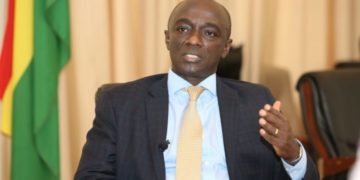Ghana’s Ambassador to China H.E Edward Boateng has opined that calls for the mass testing of Ghanaians for Coronavirus must be critically examined.
READ MORE: Coronavirus: NSA fumigating various stadia across the country
He explained his stance using his experiences in China as a focal point during a virtual panel discussion co-organized by two media giants in Ghana, Global Media Alliance Broadcasting Company (GMABC) and Kencity Media he said, “In China, they didn’t do mass testing as is being done in the USA. And I think that is the approach we should employ in Ghana. In China, you are only tested when you have high temperatures exceeding a certain threshold and that is a more creative way to go about the testing’’
According to H.E. Ambassador Boateng, embarking on mass testing does not necessarily guarantee that someone who tested negative won’t be infected if the person acts recklessly.
‘I believe the President of Ghana, Nana Akufo Addo’s approach of testing people who have been exposed and exhibiting symptoms is the best way to go. Mass testing may not be worthwhile’’ he stated.
The dialogue which aired on Happy FM, e.TV Ghana, Net2 Television, Oman FM, Ash FM and was streamed live on social media featured the following experts who worked with the ambassador during the peak of COVID-19 in China; Dr Ama Edwin, a Physician Clinical Psychologist and Bioethicist at the University of Ghana Medical Centre, Mr Abu Osuman, Minister Counsellor, Embassy of Ghana Beijing China, Dr Percy Akuetteh, Hepatobiliary Surgery PhD student and Chairman of Ghanaian Community Association Wenzhou chapter, Mr Sampson Opoku, PhD Candidate and NUGS Chapter President, Wuhan-China and Miss Gloria Akpabla, Women’s Commissioner, NUGS China.
READ MORE: Bawumia launches online scholarship application system
The virtual dialogue was moderated by Samuel Eshun, host of ‘Happy Morning Show’ on Happy FM and Abedi Anim host of The Dialogue on Net 2 TV.
The theme for the panel discussion was “COVID-19, Dealing with the Challenges: A Dialogue with Ghanaians in China”



















